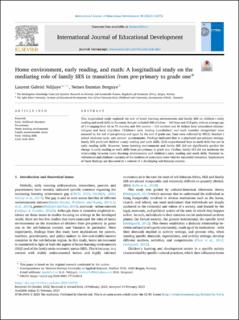Home environment, early reading, and math: A longitudinal study on the mediating role of family SES in transition from pre-primary to grade one
Peer reviewed, Journal article
Published version
Permanent lenke
https://hdl.handle.net/11250/3094909Utgivelsesdato
2023Metadata
Vis full innførselSamlinger
Originalversjon
International Journal of Educational Development. 2023, 98 . 10.1016/j.ijedudev.2023.102751Sammendrag
This longitudinal study explored the role of home learning environments and family SES on children’s early reading and math skills in Tanzania. Sample included 400 children − 182 boys and 218 girls, with an average age of 5.9 ranging from 62 to 73 months; and 400 parents – 314 mothers and 86 fathers from naturalised citizens/refugees and local majorities. Children’s early reading (vocabulary) and math (number recognition) were assessed by the end of pre-primary and again by the end of grade one. Data were collected by MELE, Bracken’s school readiness scale, and parents’ questionnaire. Findings indicated that in a playbased pre-primary settings, family SES predicted children’s early reading and math skills. Girls outperformed boys in math skills but not in early reading skills. However, home learning environments and family SES did not significantly predict the change in early reading or math skills from pre-primary to grade one. Further, family SES did not moderate the relationship between home learning environments and children’s early reading and math skills. Parental involvements and children’s mastery of the medium of instruction were vital for successful transition. Implications of these findings are discussed in a context of a developing sub-Saharan country.

